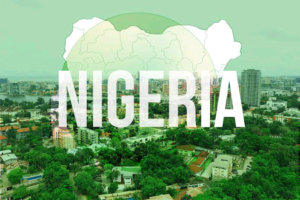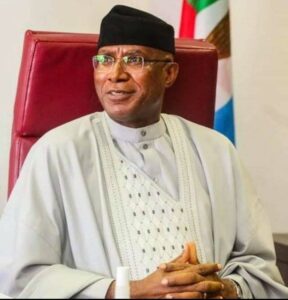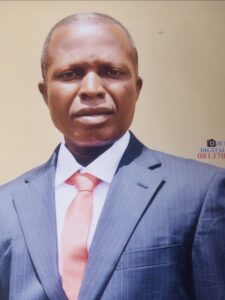Nigeria at 54: Need for Peace and Progress
By Charles Ikedikwa Soeze,
 Based on the amalgamation of the Northern and Southern protectorates of Nigeria on the 1st of January 1914 by the British colonialist, Sir Fredrick Lord Lugard, a federating state called Nigeria emerged. This same entity won independence from Britain on Saturday, 1st of October 1960. It may be necessary to state here that what Nigeria actually got from Britain was a mere political and not economic independence. As a result, Britain withdrew their governance of the country and handed over same to Nigerians. However, it was revealed that majority of the British officials settled in a certain part of the country and continued to advise them politically and otherwise until the advent of the civil war when they quickly found their way.
Based on the amalgamation of the Northern and Southern protectorates of Nigeria on the 1st of January 1914 by the British colonialist, Sir Fredrick Lord Lugard, a federating state called Nigeria emerged. This same entity won independence from Britain on Saturday, 1st of October 1960. It may be necessary to state here that what Nigeria actually got from Britain was a mere political and not economic independence. As a result, Britain withdrew their governance of the country and handed over same to Nigerians. However, it was revealed that majority of the British officials settled in a certain part of the country and continued to advise them politically and otherwise until the advent of the civil war when they quickly found their way.
It is clear that Nigeria currently occupies a land area of approximately 923,769 sq. Km. The country spans over six ecological zones ranging from the swampy coastal rain forests of the south to the semi-arid but fertile grasslands of the north. Its geographical spread is wholly in the tropics. On the west, Nigeria is bounded by the Republic of Chad; the country’s eastern side is bounded by the Republic of Cameroun; while on the south, the Gulf of Guinea.
Going by the Nigeria’s history, one can boldly and proudly say that our past leaders moulded this country with great zeal for success. This was manifested in the way and manner they collectively fought and achieved political independence for Nigeria. It is a truism to say that those crops of leaders exhibited sound leadership qualities and moral pedigree as well as professionalism that is lacking in some of our current politicians and leaders because greater part of their actions are based on ethnicity, tribalism, favouritism, among others. In the threshold of Nigeria history one can say that the abysmal performance of some of our leaders are caused by us the followers. In the words of Jide Osuntokun, we need to move away from “come and chop” politics that unfortunately permeates our society with the result that very few people can speak truth to power. This denies our leaders’ good advice and the rest of us good governance emanating from bad advice. What a dangerous dichotomy indeed at 54?
It is evident that some past leaders in Nigeria have ruined this nation and made it what great Professor Chinua Achebe (of blessed memory) refers to as: This is an example of a country that has fallen down; it has collapsed. This house has fallen”. The country has suffered and sunk into pervasive corruption, social catastrophe and economic dilapidation for a long time. Our much respected values of patriotism and uncompromising emphasis on integrity and honesty have been thrown to the winds. Most of our leaders have lost their integrity and dignity because of money and they sometime lost their sense of reasoning because of Naira if not “Nairases”.
No doubt, corruption has been instrumental in disorienting us in this country; it has made us a laughing stock of the World. We have so many good people; we have resources, which should make us the envy of other nations in the World. In view of the mismanagement of resources, under-utilisation of human resources and the syndrome of ‘get-rich-quick’ our country is in shamble. We have laws that must be enforced to punish the corrupt.
Flt. Lt. Jerry John Rawlings (alias Junior Jesus) former Ghanaian President, said thus in 2007 on corruption “…unless the citizens learn to boldly reject fraud and criminality in leaders, wrong-doing will persist; unless our people disabused the mind of politicians who think the electorates can be bought to surrender their rights and votes, leadership will continue to commit fraud; rig elections and amass ill-gotten gains at the expense of the whole country; unless our people learn to stand up against dictators and political charlatans, democracy will continue to fail in different countries at different times”.
On leadership, Professor Babatunde Fafunwa (of blessed memory), a one-time education minister and first Nigerian to acquire a Ph.D. in education in 1955 said that the revered of African leaders is Nelson Mandela (of blessed memory) who led his people out of the ‘shackles’ of apartheid, and still forged reconciliation between the races. He had a clear and great vision for South Africa, and was able to set out and accomplish his goals. Incredibly, unlike other leaders on the continent, the great man handed over power after just one term. Imagine that happening in some African countries!
We have not been fortunate to have good leaders. What we have been having is what Bishop Matthew Hassan Kukah currently of the Sokoto Catholic Diocese tagged as “accidental leaders”. The saddest thing about them is that after being sworn in with the Oath of Allegiance of good conduct, then they will proceed to churches and or mosques with members of their family, relations and associates for thanksgiving services. By the time you see them again; they have already looted the whole treasury. Dr. Akinola Aguda’s keynote address at the 3rd Obafemi Awolowo Foundation in December 1994 on a leader that Nigeria needs explain that it is not a semi-educated person lacking in intelligent, ability and transparent honesty. To this end therefore, we need to support the current administration under Dr. Goodluck Ebele Azikiwe Jonathan, GCFR, popularly known as “GEJ” a thorough and well-bred academic before going into politics.
Professor Attahiru Jega, a political scientist and the current Chairman of the Independent National Electoral Commission (INEC) actually gives the best description of some of our past leaders, when he said in a lecture at Abuja that: “If the truth be told, past Nigerian leaders with few exceptions were self-serving rulers, not leaders. Some were even despots. There is perhaps no other country in the World where power corrupts and absolute power corrupts absolutely as in Nigeria. They have generally lacked vision, they are greedy, they are vindictive, they are reckless, and in many fundamental respects senseless.
In his book The Trouble with Nigeria, Professor Chinua Achebe, a renowned novelist, poet, and critic, strongly argued that Nigeria has not yet achieved nationhood. He said a country where citizens are ethnic conscious and indulge in all manner of cutting-corners to make money at the expense of the nation has not arrived.
There is no doubt that at 54 securities of lives and properties are no longer guaranteed. The image of lawlessness is seen everywhere. Consequently, Nigerians live in frustration, regret, dejection, hopelessness, misery, pains and sufferings. The deadly sect Boko Haram can be translated in Igbo language to free us that is, Biko Haram meaning I beg leave me. Boko Haram should embrace peace and accept western education and not to see western education as a sin. All the things we enjoy are because of western education.
Many years ago, Dele Giwa, Rear Admiral Onigbinde, O.N. Rewane, Funso Williams were killed. Prior to the 2003 senatorial election, Chief John Monoria Agbatutu of Agbarho in Delta State was killed before the primaries. The Asipa of Oyo was clubbed to death. On the 21st of December 2001, Odunayo Olagbaju, member of Osun State House of Assembly was killed by gun-men in Ile-Ife. On the 23rd of December 2001, Chief Bola Ige (siddon look) former justice minister was murdered in his room while on August 15, 2002 gun-men killed Victor Nwankwo. September 26, 2002 John Nuhu, treasurer of Akassa Council in Bayelsa State was killed. November 25, 2002 PDP gubernatorial candidate, Dele Arojo was assassinated in Lagos. We always hear that the killers will be brought to book or be fished out. How many of them have we been able to fish out? Engr. Hamed Olatunde Onipede, second substantive principal/chief executive of the Petroleum Training Institute (PTI), Effurun, Delta State for approximately a decade was murdered in his apartment in Badagry. Others include Kwara State Commissioner of Police, Mr. Chinwike Asadu who was killed on March 2, 2013, while on a private visit to his state, Enugu; Harry Marshall, Jerry Agbeyegbe, Sunday Ugwu, Odunayo Olagbaju, Janet Oladapo, Ahmed Pategi, Chimere, Ayodeji Daramola, Dele Arojo, Isyaku Muhammadu, Udo Marcus Akpan, Ogbonnaya Uche, Abigail and Barnabas Igwe. The killings were too numerous to mention. Without mincing words, Nigeria needs to take security very seriously.
However, I wish to quote Abraham Lincoln’s statement in Gethysbury, on the 19th of November 1863 for our information and guidance. “That this country under God shall have a new birth of freedom and that government of the people by the people shall not perish from the earth”.
It seems to me that for Nigeria to move forward in the right direction, we need to love one another. According to the Holy Bible, in the book of 1st Corinthians 13:4-8; it states thus, “Love is patient, love is kind. It is not rude. It does not seek its own interest. It is not quick-tempered, it does not brood over injury,… it bears all things,… endures all things. Love never fails”. Also the Holy Quran preaches love, patience, generosity and honesty in all ramifications. The following two verses from the Holy Quran testify for this; “Verily man is in loss, except such as have faith, and do righteous deeds, and truth and of patience and constancy”. Holy Quran 103:2-3. This second verse gives the Islam as peace and submission to the will of God and not the will of people; “It is not righteous that you turn your faces towards East or West. But it is righteous to believe in Allah and the last day, and the Angels, and the book, and the messengers. To spend your substance, out of love for Him, for your kin, for orphans, for the needy, for the wayfarer, for those who ask, and for the ransom of slaves; to be steadfast in prayer and give in charity; to fulfil the contracts which you have made; and to be firm and patient; in pain and adversity and throughout all periods of panic. Such are the people of truth, the God-fearing”. Holy Quran 2:177.
Charles Ikedikwa Soeze, fhnr, fcida, fcai, fswca, cpae, chnr, son, ksq, emba, ghnr is a mass communication scholar from first degree to doctoral level, a retired Assistant Director (Administration)/Head, Academic and Physical Planning (A&PP) of the Petroleum Training Institute (PTI) Effurun, Delta State, Nigeria. He is also a public affairs analyst/commentator on local, national and international issues. (08036724193) charlessoeze@yahoo.ca



